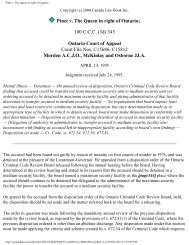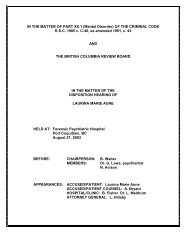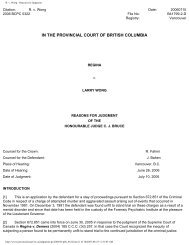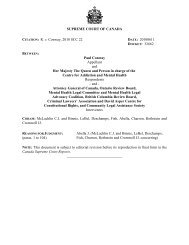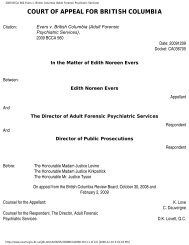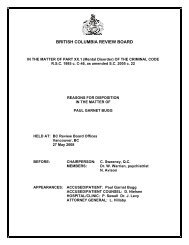R. v. Cuerrier - British Columbia Review Board
R. v. Cuerrier - British Columbia Review Board
R. v. Cuerrier - British Columbia Review Board
Create successful ePaper yourself
Turn your PDF publications into a flip-book with our unique Google optimized e-Paper software.
R. v. <strong>Cuerrier</strong><br />
Per Cory, Major, Bastarache and Binnie JJ.: To prove the offence of aggravated assault, the Crown<br />
must establish (1) that the accused's acts "endanger[ed] the life of the complainant" (s. 268(1)) and (2)<br />
that he intentionally applied force without the consent of the complainant (s. 265(1)(a)). The first<br />
requirement is satisfied in this case by the significant risk to the lives of the complainants occasioned by<br />
the act of unprotected intercourse. It is unnecessary to establish that the complainants were in fact<br />
infected with the virus. With respect to the second requirement, it is no longer necessary, when<br />
examining whether consent in assault or sexual assault cases was vitiated by fraud under s. 265(3)(c), to<br />
consider whether the fraud is related to "the nature and quality of the act". The repeal in 1983 of<br />
statutory language imposing this requirement and its replacement by a reference simply to "fraud"<br />
indicates that Parliament's intention was to provide a more flexible concept of fraud in assault and sexual<br />
assault cases. To that end, principles which have historically been applied in relation to fraud in<br />
criminal law can be used with appropriate modifications.<br />
In the context of the wording of s. 265, an accused's failure to disclose that he is HIV-positive is a<br />
type of fraud which may vitiate consent to sexual intercourse. The essential elements of fraud in<br />
commercial criminal law are dishonesty, which can include non-disclosure of important facts, and<br />
deprivation or risk of deprivation. The dishonest action or behaviour must be related to the obtaining of<br />
consent to engage in sexual intercourse -- in this case unprotected intercourse. The accused's actions<br />
must be assessed objectively to determine whether a reasonable person would find them to be<br />
dishonest. The dishonest act consists of either deliberate deceit respecting HIV status or non-disclosure<br />
of that status. Without disclosure of HIV status there cannot be a true consent. The consent cannot<br />
simply be to have sexual intercourse. Rather, it must be consent to have intercourse with a partner who<br />
is HIV-positive. The extent of the duty to disclose will increase with the risks attendant upon the act of<br />
intercourse. The failure to disclose HIV-positive status can lead to a devastating illness with fatal<br />
consequences and, in those circumstances, there exists a positive duty to disclose. The nature and extent<br />
of the duty to disclose, if any, will always have to be considered in the context of the particular facts<br />
presented. To establish that the dishonesty results in deprivation, which may consist of actual harm or<br />
simply a risk of harm, the Crown needs to prove that the dishonest act had the effect of exposing the<br />
person consenting to a significant risk of serious bodily harm. The risk of contracting AIDS as a result<br />
of engaging in unprotected intercourse meets that test. Further, in situations such as this, the Crown is<br />
still required to prove beyond a reasonable doubt that the complainant would have refused to engage in<br />
unprotected sex with the accused if she had been advised that he was HIV-positive. Therefore, a<br />
complainant's consent to sexual intercourse can properly be found to be vitiated by fraud under s. 265 if<br />
the accused's failure to disclose his HIV-positive status is dishonest and results in deprivation by putting<br />
the complainant at a significant risk of suffering serious bodily harm.<br />
An approach to the concept of fraud in s. 265(3)(c) of the Code that includes any deceit inducing<br />
consent to contact would bring within the sexual assault provisions of the Code behaviour which lacks<br />
the reprehensible character of criminal acts and would trivialize the criminal process by leading to a<br />
proliferation of petty prosecutions instituted without judicial guidelines or directions. Some limitations<br />
to the concept of fraud in that section are necessary. The fraud required to vitiate consent for sexual<br />
assault must carry with it the risk of serious harm. This standard is sufficient to encompass not only the<br />
http://ql.quicklaw.com/qltemp/C2KEwCMAFbZMTYcs/00011scr-00019415%2ehtm (2 of 44)2007-08-21 1:18:15 PM



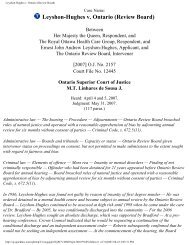
![LaFortune [LaFortunate] (Re) - British Columbia Review Board](https://img.yumpu.com/42779845/1/190x245/lafortune-lafortunate-re-british-columbia-review-board.jpg?quality=85)
